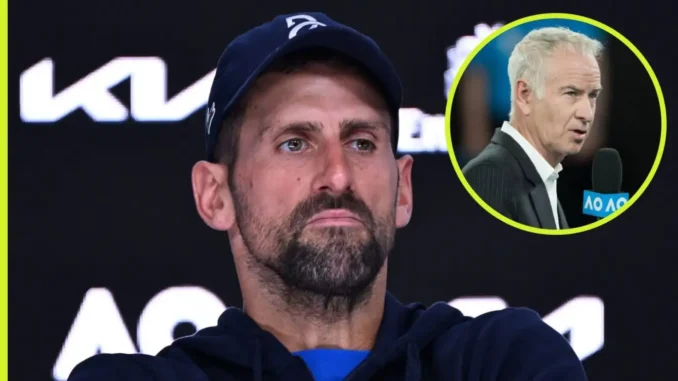
Djokovic’s Rebuttal: Addressing McEnroe’s Accusations and the Complexities of On-Court Behavior
The world of professional tennis, a stage where athleticism and mental fortitude intertwine, has recently witnessed a clash of perspectives between two titans of the game: Novak Djokovic and John McEnroe. At the heart of this exchange lies a sensitive issue – the perception of faking injuries on the court. Djokovic, the current world number one, has responded to accusations leveled by McEnroe, suggesting that the legendary American player may have “provoked” him with his comments. This exchange has reignited a debate about on-court behavior, the pressures faced by elite athletes, and the delicate line between strategy and gamesmanship.
McEnroe, known for his fiery temper and outspoken commentary, has often been critical of Djokovic’s on-court demeanor, particularly his tendency to take medical timeouts and appear to exaggerate injuries. These criticisms, delivered with McEnroe’s characteristic bluntness, have clearly struck a nerve with Djokovic, who has now offered his perspective on the matter. Djokovic’s response suggests that he feels McEnroe’s accusations are not only unfair but also potentially designed to unsettle him and gain a psychological edge. He has implied that McEnroe’s comments might be a form of provocation, intended to distract him and disrupt his focus during matches.
Djokovic’s perspective sheds light on the complex dynamics at play in professional tennis. The pressure to perform at the highest level is immense, and players often employ a variety of strategies to gain an advantage over their opponents. These strategies can include tactical timeouts, changes in pace, and even, in some cases, the strategic use of medical timeouts. While some may view these tactics as gamesmanship, others argue that they are simply part of the competitive landscape, a way for players to manage their physical and mental state during grueling matches.
The issue of faking injuries is particularly sensitive. While genuine injuries are a common occurrence in professional tennis, the perception that some players might exaggerate or fabricate injuries to gain an advantage has been a source of controversy for many years. Accusations of faking injuries can damage a player’s reputation and lead to accusations of unsportsmanlike conduct. Djokovic’s response to McEnroe’s comments suggests that he feels he has been unfairly targeted, and that his use of medical timeouts has been misinterpreted.
Djokovic’s defense rests, in part, on the idea that McEnroe’s comments might be a form of psychological warfare. By publicly questioning the legitimacy of Djokovic’s injuries, McEnroe could be attempting to plant seeds of doubt in his mind and undermine his confidence. This kind of psychological gamesmanship is not uncommon in professional sports, where athletes often seek any edge they can find, both on and off the field of play.
The exchange between Djokovic and McEnroe highlights the blurred lines between strategy and gamesmanship in professional tennis. What one player considers a legitimate tactic, another might perceive as unsportsmanlike behavior. The debate raises questions about the rules of engagement and the ethical boundaries of competition. Where does strategy end and gamesmanship begin? And how can we distinguish between genuine injuries and those that might be exaggerated for strategic purposes?
The controversy also underscores the intense scrutiny that top athletes face. Every aspect of their game, their behavior, and even their physical condition is subject to public scrutiny and analysis. This constant pressure can take a toll on athletes, who are often forced to defend their actions and explain their motivations. Djokovic’s response to McEnroe’s accusations suggests that he feels he has been unfairly judged, and that his on-court behavior has been misinterpreted.
The debate about faking injuries is likely to continue. It is a complex issue with no easy answers. While it is important to maintain the integrity of the sport and to discourage unsportsmanlike behavior, it is equally important to recognize the pressures faced by professional athletes and to avoid making snap judgments based on limited information. Djokovic’s response to McEnroe’s comments has added another layer to this ongoing discussion, highlighting the challenges of navigating the fine line between strategy and gamesmanship in the high-stakes world of professional tennis. It is a conversation that is likely to continue as long as the sport is played.
Leave a Reply